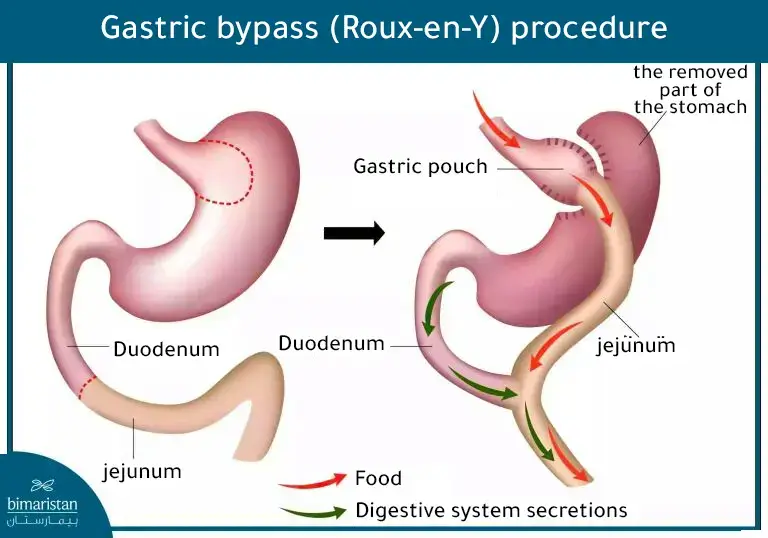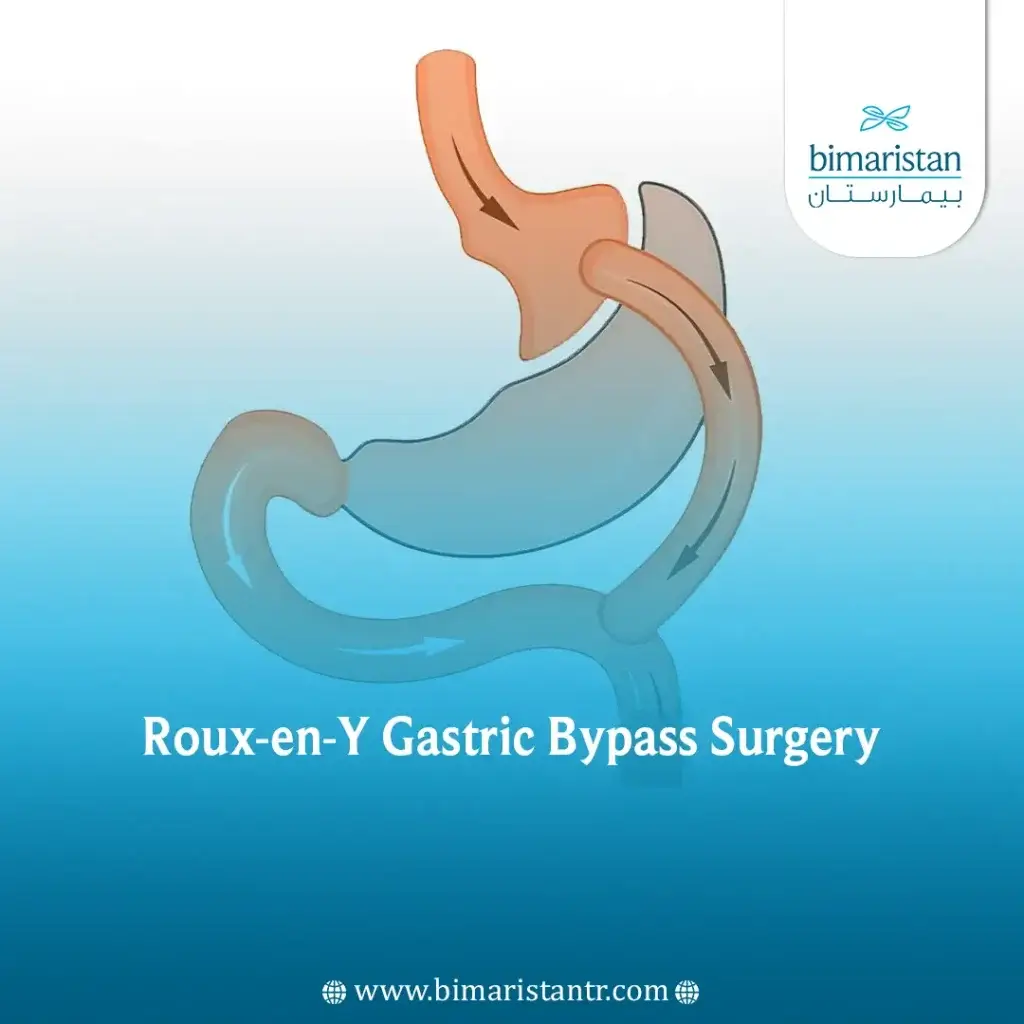Gastric bypass surgery (Roux-en-Y) can help you lose and reach your ideal weight. So, what are the benefits of this surgery, and how is it performed?
Suppose you want a practical solution to help you lose excess weight and prevent obesity-related problems such as diabetes and heart disease. In that case, gastric bypass surgery in Turkey is one of the best options. Despite the prevalence of several types of obesity surgeries in Turkey, bariatric bypass surgery is considered one of the most common therapeutic procedures due to its excellent and rapid results in weight loss compared to other obesity procedures.
This procedure is performed using minimally invasive surgical endoscopy, making stomach bypass surgery relatively safe. The cost of gastric bypass surgery in Turkey is relatively low compared to other countries. Let’s shed more light on the details of this procedure, discussing its benefits and risks.
What is Roux-en-Y gastric bypass surgery?
Rny gastric bypass is considered the gold standard for weight loss surgery. It is the most important and well-known procedure performed for weight loss and diabetes treatment worldwide.
During the operation, the surgeon makes some changes to the stomach and small intestine to alter how food is absorbed and digested. After the surgery, the stomach will be smaller, and the small intestine will be shortened, helping to reduce food intake and absorption, thus addressing the modern issue of obesity.
This procedure not only helps to get rid of excess weight but also helps to prevent or delay the onset of metabolic complications associated with obesity or caused by it, such as heart disease, diabetes, and joint diseases.
Rny bypass helps the patient lose weight through:
- Restricting the amount of food the stomach can hold.
- Reducing the amount of food the patient can consume.
- Limiting the intake of calories and nutrients absorbed by the body.
- Altering intestinal hormones, thereby prolonging the feeling of satiety.
Gastric bypass surgery: benefits and risks
Benefits of gastric bypass surgery
Weight Loss:
Stomach bypass surgery is one of the most effective surgical procedures for weight loss in individuals with severe obesity.
It can lead to losing 70-80% of excess weight within 1-2 years.
It can help control appetite and create a feeling of fullness after consuming a small amount of food.
Improvement of Health Conditions:
It helps improve or treat many health conditions associated with obesity, such as:
- Type 2 Diabetes: It can lead to rapid improvement in blood sugar levels and may eliminate the need for medications or even completely cure the condition.
- High Blood Pressure: It can significantly reduce blood pressure.
- Obstructive Sleep Apnea: It can significantly improve symptoms or completely cure the condition.
- High Cholesterol: It can improve LDL (bad) cholesterol and triglyceride levels.
- Joint Pain: It can alleviate joint pain, especially in the knees.
Improvement in Quality of Life:
It can improve quality of life by increasing energy, enhancing mood and self-esteem, and boosting physical activity.
Risks of gastric bypass surgery
General Risks for any Surgery:
- Infection
- Bleeding
- Blood clots
- Allergic reaction to anesthesia
Specific Risks of Bypass Surgery:
- Vitamin and Mineral Deficiency: Patients must take lifelong supplements to ensure they receive enough vitamins and minerals, such as Vitamin B12, iron, and calcium.
- Diarrhea: Diarrhea can occur, especially in the first few months after surgery, due to changes in how the body absorbs food.
- Dumping Syndrome: This syndrome can occur when food moves too quickly from the stomach to the small intestine, causing nausea, vomiting, diarrhea, and sweating.
- Peptic Ulcer: There is an increased risk of developing peptic ulcers in the remaining part of the stomach.
- Stomach Leakage: This is the leakage of intestinal contents from the stomach into the abdominal cavity, a serious condition requiring immediate medical intervention.
- Hiatal Hernia: A hiatal hernia can occur when some abdominal organs protrude through a weak opening in the diaphragm muscles.
- Changes in Body Appearance: After significant weight loss, some people may experience loose skin in areas like the abdomen, arms, and thighs.
- Psychological Disorders: The surgery may increase the risk of developing depression and anxiety.
Who are the candidates for roux en y surgery in Turkey?
Your doctor may recommend roux bypass in several cases, including:
- If your Body Mass Index (BMI) is higher than 40.
- If your BMI is between 35 and 40 but you have a metabolic syndrome associated with obesity.
- If you have type 2 diabetes due to obesity.
- If obesity affects your daily life and relationships with those around you.
- If exercise and diet have not yielded promising long-term results.
Preparations before by pass surgery
The patient should attempt to lose weight as much as possible before gastronomic bypass, as the lighter the weight before the operation, the better the results and the faster the recovery. Weight loss also reduces the size of your liver, making the surgery easier for the doctor.
The patient should meet with their nutritionist a month before the surgery to determine the appropriate diet before and after the operation and make necessary changes to daily habits. Suppose the patient is a drinker or smoker. In that case, the doctor advises complete cessation as these have negative effects on health in general and the success of roux bypass surgery in particular.
The doctor may also request several tests before the surgery to ensure the patient’s readiness. These tests may include blood tests, X-rays of the chest and abdomen, and an assessment of the heart and digestive system. The patient may be asked to stop any pain relievers or anticoagulants before the surgery and should not eat anything for 12 hours before the operation.
Bimaristan Center provides the best surgical, medical, and nutritional staff. Our center guides you step by step to overcome obesity definitively with the help of experienced hands in the field of obesity treatment.
Steps of gastric bypass surgery and its types
Gastrisk bypass involves several maneuvers. Traditional open surgery was widespread 30 years ago, but with the development of laparoscopic surgery and its wider application in Turkey, laparoscopic gastric bypass surgery emerged. Due to its fewer complications, smaller surgical incisions, shorter recovery time, and higher success rate, doctors have primarily favored this method.
This surgery can also be performed robotically, but it usually yields the same results and is more costly.
Laparoscopic gastric bypass surgery in Turkey
First, the doctor makes four or five small surgical incisions, each not exceeding an inch, and inserts surgical instruments through these incisions.
Then, the doctor creates a small pouch for the stomach -about the size of an egg- by separating the upper part of the stomach from the rest of it, leaving the lower part connected to the duodenum (the first part of the small intestine).
Next, the doctor cuts the small intestine, lifts the Roux (the lower end of the cut small intestine) from the small intestine, and connects it to the newly created small stomach pouch.
Then, the upper part of the divided small intestine (where liver and pancreatic juices are poured onto it) is connected to the lower part of the small intestine from the side. This mixes stomach acids and food from the stomach and the first part of the small intestine with digestive juices from the second part of the small intestine at the end of the intestines.

Advantages of gastric bypass surgery in Turkey
Advantages of roux en y procedure include:
- Significant weight loss and excellent short-term results (60 to 80 percent of excess weight).
- Permanent and long-term results (data indicates that its effects can last more than ten years after surgery, with most patients maintaining over 50 percent of excess weight loss).
- It is an excellent solution for health problems related to severe obesity, as it is considered the optimal solution for metabolic disease problems such as high blood sugar, high pressure, arteriosclerosis, and high cholesterol, and it is regarded as the optimal treatment for metabolic syndrome.
- Additionally, it treats problems related to sleep apnea.
Recent studies indicate the long-term efficacy of gastric bypass surgery in high-risk elderly patients, thus improving their overall health with increased survival rates by 30-40 percent, primarily by reducing the risk of heart and vascular diseases and cancer.
Disadvantages of Gastric Bypass Surgery
No medical procedure is without the possibility of unwanted side effects, and for gastric bypass surgery, the following may occur:
- There is an increased risk of vitamin and mineral deficiency compared to regular patients. All patients need to take vitamins and dietary supplements for life after surgery, and failure to do so may lead to long-term deficiencies, especially in vitamin B12, iron, calcium, and folic acid.
- Increased risk of gallstones.
- Increased risk of ulcers when taking non-steroidal anti-inflammatory drugs or smoking, so patients are not allowed to take aspirin or other non-steroidal anti-inflammatory medicines after surgery.
- Intestinal obstruction.
- Increased risk of suicide.
- Dumping syndrome (low blood sugar) is caused by the rapid entry of food into the intestines without digestion after gastric bypass surgery.
- Slightly higher rate of long-term complications compared to gastric sleeve surgery.
At Bimaristan Center, we provide you with the best centers that perform Roux-En-Y gastric bypass surgery using laparoscopy. This means shorter hospital stays, recovery time, less pain, and scarring. We also offer patients other options for obesity treatment, such as gastric balloon or laparoscopic gastric banding.
What can you expect after laparoscopic gastric bypass surgery?
In the first month, you can only consume small amounts of soft foods and liquids, but gradually, you can add some solid foods to your diet.
You will notice feeling full very quickly after consuming about two tablespoons of food, and your doctor may also recommend dietary supplements.
During the first two years, you can expect to lose half to two-thirds of your excess weight, and weight loss will continue in most cases for a year and a half before stabilizing. Studies have shown that gastric bypass surgery in Turkey is more effective than gastric sleeve surgery in both the short and long term for weight loss.
My experience with gastric bypass surgery
The Beginning:
I never hid my struggle from anyone; my battle with morbid obesity was evident to all. I fought for years to lose weight but to no avail. I tried everything available, from strict diets to intense workouts, but the result was always disappointing. I couldn’t shed those extra kilograms that burdened my body and weighed down my spirit.
The Decision to Change:
One day, I read about gastric bypass surgery. It felt like a candle of hope was lit in the darkness of despair. I consulted with a specialist doctor, and we discussed all aspects, the benefits, and the risks. He explained the details of the procedure and the recovery process. It wasn’t an easy decision, but I was determined to change my life for the better.
A Difficult Journey:
I underwent the surgery and began a new journey full of challenges. I faced some difficulties at first, especially with the new diet, but my determination to succeed was stronger than any pain or fatigue.
Sunshine After the Rain:
As time passed, I started to notice positive changes. I lost weight rapidly and significantly, and my overall health improved. I no longer suffered from shortness of breath or joint pain, and my energy and activity levels increased substantially.
Life After Gastric Bypass:
My journey wasn’t easy, but it was worth all the effort. My life changed dramatically after gastric bypass surgery. I became more confident in myself and more capable of enjoying life.
Golden Advice:
If you’re considering undergoing gastric bypass surgery, I advise you to:
- Consult a Specialist Doctor: Ensure you get all the necessary information from an experienced specialist.
- Mental Preparation: Be mentally prepared for the changes in your life after the surgery.
- Follow Instructions: Adhere strictly to your doctor’s instructions to ensure a smooth and safe recovery process.
- Patience: Don’t expect quick results; losing weight and improving health is a process that takes time.
- Psychological Support: Seek out support groups or talk to people who have undergone the same surgery for encouragement and support.
In conclusion, gastric bypass surgery is one of the best surgical procedures for treating obesity in Turkey due to its excellent results in weight loss over a short period compared to other obesity surgeries. Additionally, it is performed using endoscopy, making it low-risk and also distinguished by its low cost in Turkey compared to neighboring countries.
References:
- Laparoscopic Roux-en-Y Gastric Bypass.
- Safety and efficacy of roux-en-y gastric bypass in older aged patients.

